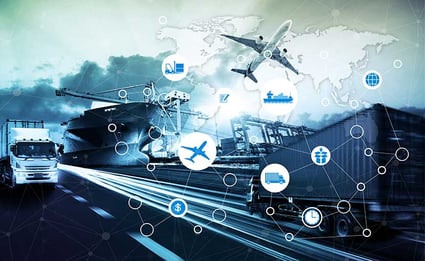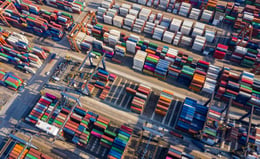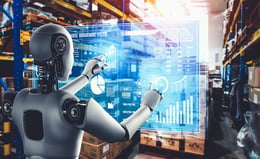Your Supply Chain Must Think Like the Best Rocket Scientist
Keith LaBotz - January 06, 2022

Improve Your Supply Chain Predictions for 2022 and Beyond
“I'm convinced that before the year 2000 is over, the first child will have been born on the moon.” - Wernher Von Braun
We don’t need more supply chain predictions from experts; we need to improve predicting outcomes in supply chains. We need to think like Werner Von Braun.
The challenges supply chains face in 2022 rival those Von Braun, and his team of scientists overcame when leading America to the moon. The global supply chain and rocket science share much in common, and their success ultimately depends on predicting and controlling outcomes. Supply chains can adopt Von Braun’s mindset to improve results.
Research shows we can improve the accuracy of our predictions and that Von Braun excelled in the most influential factors. Most importantly, you can do the same thing if you learn to think like Von Braun.
Why Werner Von Braun
I was driving back from the Port of Oakland a couple of weeks ago, thinking about what’s in store for the New Year and the mess I’d just seen - the inefficiency, truck congestion, huge potholes in the roads around the berths. And you know, long drives are perfect for wandering minds. So mine took a detour to my childhood.
My father directed Research and Development of liquid rocket engines for Aerojet, an Aerospace manufacturer. Like others who worked with NASA at the time, he’d met Von Braun at various functions, probably just a handshake. The “Father of Rocket Science” was a household name, and my three degrees of separation to Von Braun came through Rudi Beichel.
Rudi and my dad worked together for years and became close friends. As a kid, I took an instant liking to the elderly rocket scientist with a heavy accent. He was highly regarded, and his credentials let him write his own ticket. Rudi was one of Von Braun’s original team members, which conferred status, but he couldn’t care less about all the fuss. I revered him as the not-so-famous alternative to Von Braun.
Poor Rudi had to answer the same questions about his pal Von Braun tens of thousands of times. Only a true friend would endure decades of retelling the stories with enthusiasm. I’ll never forget Rudi Beichel for the spark in his eyes, his kindness, quick wit, and great sense of humor.
The Supply Chain is More Complex than Rocket Science
Ping-pong back to the present. The global supply chain and rocket science share many similarities, so what works for one should work for the other, right? Well, sort of.
- The global supply chain and rocket science are both complicated.
- Much of the technology supply chains rely on today has origins in the space program.
- Both coordinate the delivery of objects to a precise location at the exact time.
- Risk management is vital for a successful mission.
A rocket engine is a closed system with a relatively smaller set of variables, concerned only with physics. While there’s mind-bending engineering, testing designs can reproduce and predict outcomes.
In contrast, the global supply chain is a complex, unpredictable system. It’s subject to the most volatile and misunderstood force in the universe: human behavior. All we can know for sure are probabilities. Predicting the collective behavior of consumers, financial markets, political agencies, and businesses has never been achieved. Houston, we have a problem.
You Must Become a Supercomputer
Von Braun observed, “The best computer is a human, and it’s the only one that can be mass-produced by unskilled labor.” On the surface, this sounds simplistic, but it’s profound when looking at a complex system like the supply chain.
Predicting how people will respond in various scenarios is very difficult. AI can detect variability within the process but fails to recognize emotions, social pressures, physical discomfort, cultural nuances, or personalities. These can change the outcome for a single transaction or an entire company.
The more aware we become of the behavioral factors with supply chain partners and markets, the more attuned the supply chain process to executing our predictions. We might view our role in the system as a supercomputer for monitoring people and predicting their actions.
How do you become a supercomputer? By understanding the process, the problem, and the solution. Clearly define your vision and turn it into a holistic, shipment-centric supply chain model (a lean, green process is good).
Question the Experts
If you’re operating like a supercomputer, is there any reason to look to experts for direction? I’m not advocating ignoring expert advice but suggesting you work on becoming an expert.
Von Braun built his career on making accurate predictions; hypotheses from his experiments, and he said, “One test result is worth one thousand expert opinions.” He valued hard evidence over opinions, and his stellar record resulted from diligently following the scientific method.
What about Von Braun’s failed moon baby prediction? His moon baby was not a hypothesis from testing data; it was born from speculation. It was based on NASA’s plan for a lunar colony that got canceled after he made this statement. Ironically, Von Braun’s moon baby unintentionally proved his advice against trusting expert opinions.
Von Braun is a Model to Emulate
The foremost researcher on prediction agrees with Von Braun’s advice. The Harvard Business Review mentions a study by Dr. Philip Tetlock found the average expert was only slightly more accurate than a dart-throwing chimpanzee.
Tetlock concludes it’s possible to improve the prediction accuracy by improving several factors, and I’ve added my comment for supply chains:
- Intelligence - AI can augment IQ to boost the intelligence of a process.
- Domain expertise - Start with a good model to understand the bigger picture.
- Practice making predictions - Use predictive analytics and forecasting solutions.
- Teams outperform individuals - A holistic view of the supply chain creates a team.
- Open-minded people who have intellectual humility - Continuous Improvement!
It should come as no surprise that Von Braun excelled in each of these factors. Tetlock’s book Superforecasting goes into the factors in more detail, and he adds intellectual humility begins by recognizing we often do not perceive and judge reality accurately. A previous post on changing beliefs about supply chain realities came to this same conclusion and offered solutions to improve the supply chain.
Conclusion
There is so much to learn from Von Braun, and the current crisis is the product of short-term thinking and quick fixes. Expert opinions are sought for quick answers rather than performing due diligence. AI is expected to fix our problems instead of doing a proper analysis. Businesses fixate on quarterly numbers and governments on the latest polls. When the long-term consequences are ignored, the cans get kicked down the road, making disastrous decisions.
The good news is supply chains can begin seeing improvements once they start thinking like Von Braun. Big picture, long-term thinking. Seeking hard evidence instead of expert opinions and getting in touch with the human side of supply chains. These steps will allow supply chains to increase the accuracy of predictions to reduce risks further, regardless of volatility.
I hope you found something helpful in this post that you can take forward in 2022.
LATEST POSTS
- Understand Circular Economy in The Manufacturing Industry
- How Can Industry 4.0 IT Integration Be Achieved Smoothly?
- The Significance of Order Sequencing in Discrete Manufacturing
- How to improve your Supply Chain Management: The Power of Control Towers
- Optimizing Human Resource Scheduling in Manufacturing: A Technological Approach



